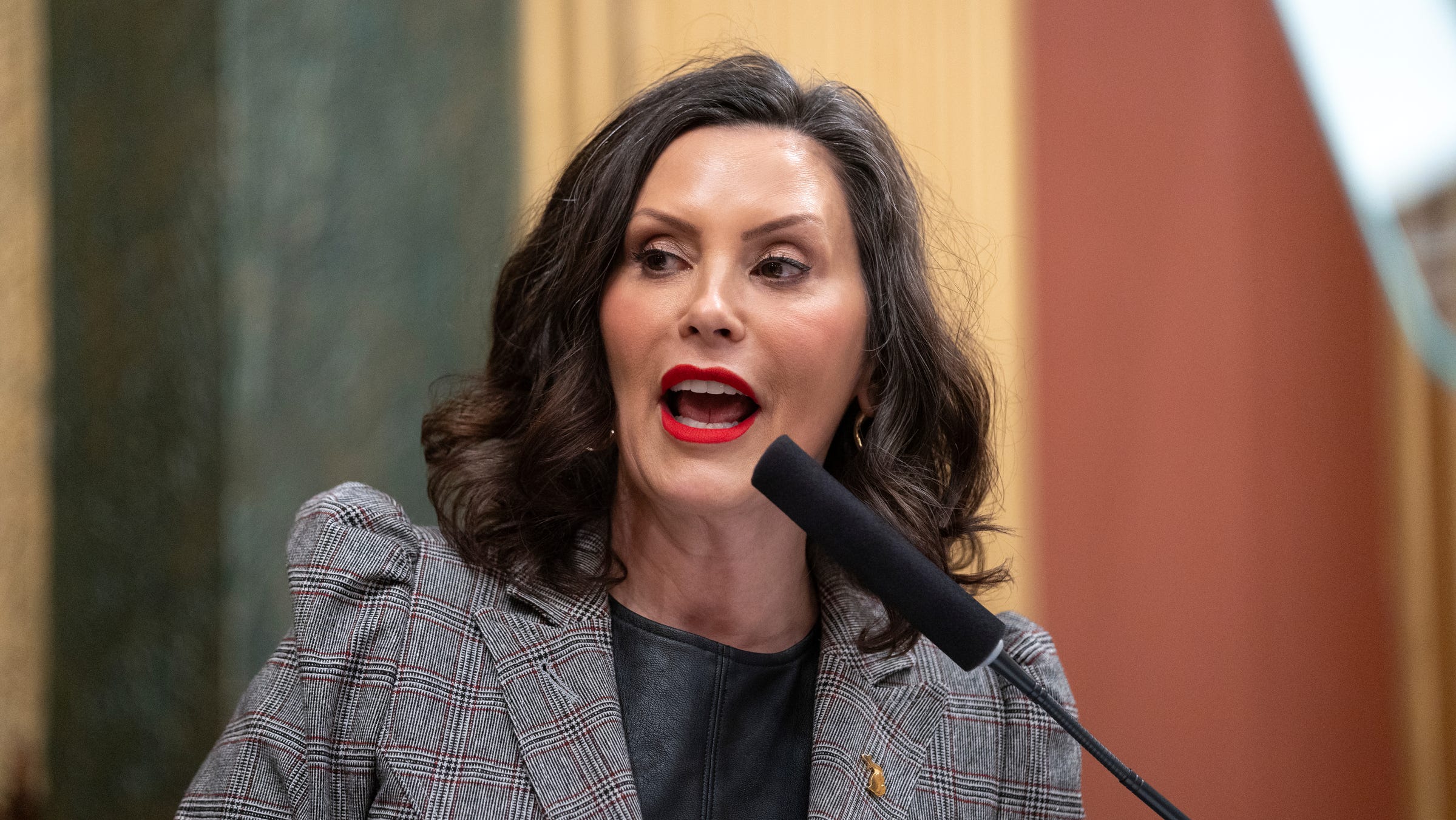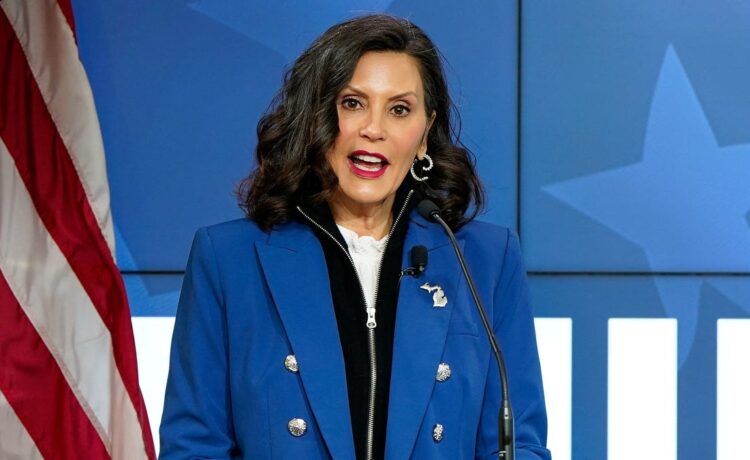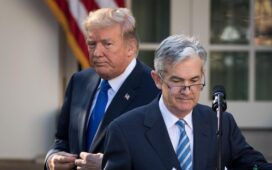
Gov. Gretchen Whitmer agrees with Donald Trump on manufacturing, not widespread tariffs
Michigan’s Governor Gretchen Whitmer delivered a speech in Washington, D.C. for “Build, America, Build.”
- Michigan Gov. Gretchen Whitmer criticized President Trump’s tariff policy as a “blunt tool” that threatens economic “paralysis”.
- Whitmer advocated for a strategic approach to re-industrialization, focusing on industries like shipbuilding, aircraft manufacturing, and semiconductor chips.
- She highlighted the negative impact of tariffs on Michigan’s auto industry, citing job losses and higher costs.
Gov. Gretchen Whitmer on Wednesday blasted President Donald Trump’s indiscriminate use of import tariffs as threatening economic “paralysis” if they continue and outlined a strategic vision of using specific measures to protect industries like auto manufacturing while rebuilding the nation’s capacity to build ships, aircraft and computer chips.
“I’m not against tariffs outright, but it is a blunt tool,” Whitmer, a two-term governor who has been mentioned by pundits as a possible Democratic candidate for president in 2028, said in a half-hour speech at the Council of Foreign Relations offices near the White House in Washington. “You can’t just pull out the tariff hammer to swing at every problem without a clear, defined end goal, (and) we cannot underestimate or underappreciate the time and capital it’s going to take to actually bring jobs and supply chains back home.”
“There’s not a shortcut here. Strategic re-industrialization must be a bipartisan project that spans multiple presidential administrations. So to get it done, we’ve got to work with our friends and compete against our adversaries,” she continued. “We need to be strategic about tariffs on the technology we actually want to make in America and on industries where we already have a sizable competitive advantage.”
Whitmer’s speech, characterized as a major one by her staff, came before Trump announced a lowering of reciprocal tariffs on other nations excluding China to 10% for 90 days while additional negotiations continue, though that doesn’t include sectoral tariffs like those on auto imports. The speech also was delivered ahead of another scheduled meeting between Whitmer and Trump at the White House on Wednesday, her third since the Republican president’s January inauguration and one at which she was to be accompanied by state House Speaker Matt Hall, R-Richland Township.
Throughout Wednesday’s speech and a question-and-answer discussion with former Fox News journalist Gretchen Carlson, Whitmer made clear that she wants to work with Trump, including on tariffs, to produce more jobs and a better quality of life for Michiganders.
In the session with Carlson, she downplayed any suggestion she’s planning a run for the presidency, saying her only interest was in raising concerns over the scope of Trump’s tariffs — which have rocked global stock markets in recent days and weeks, with economists predicting higher consumer prices and a possible recession — while also underscoring her belief that Trump’s desire to increase manufacturing in the U.S. is a positive one she broadly supports.
“This is what we did in Michigan during World War II,” she told Carlson, referring to the so-called Arsenal of Democracy that saw auto manufacturing in the state retooled to churn out aircraft to help win that war. “This is what we are capable of as a nation. We need leadership that stays focused. … I desperately want whomever is here in the White House today or in the future to really be thinking long term about: How do we build a country that is leaders, that is revered again, that is dominant in these industries and that has a lifestyle that is the envy of the world.”
“That’s who we were at one point. We can be that again,” she said.
It was also discussed during the session with Carlson following the speech that Trump’s widespread use of tariffs is causing a level of uncertainty for businesses that will hurt, not foster, growth. “No company is going to be able to invest hundreds of millions or billions of dollars, in many cases, much less make decadeslong investments, because you don’t know what the rules are,” she said. “We’re going to see contraction. We’re going to see paralysis that is going to lead to job losses and higher costs for people.
“I will continue to encourage the White House to think about what the long-term strategy is,” she added.
Whitmer was a key ally of former President Joe Biden’s and the Democratic nominee in last year’s presidential election, former Vice President Kamala Harris. But since Trump’s election, she has spoken several times, as she did Wednesday, of the need to work with Trump for the sake of the state while also criticizing his administration where it’s called for.
“We should be able to celebrate good policy no matter where it comes from, and also criticize bad policy wherever it comes from,” she said. “There’s a lot more common ground here than we think, while partisanship seems to have infected every aspect of our lives and it’s exhausting.”
Whitmer noted at length the harm Trump’s tariffs — including a 25% tax on imported autos and auto parts, as well as those on steel and aluminum — are already having on a domestic auto industry largely based in Michigan that depends on supply lines that extend across North America and the globe.
“I’m not going to sugarcoat it. These last few days have been really tough for Michigan,” she said. “Twenty percent of our economy is tied to the auto industry, which depends on a steady flow of goods from our largest and closest trading partners. We’re home to the busiest international border crossing in North America. … We’re already seeing the impacts of auto companies stockpiling parts and laying off workers. Suppliers are facing higher costs and delaying expansions. Dealerships are forced to raise prices by up to $15,000 amid slowing sales, and since every single auto job supports three others in the community, the impact is being felt by all of us.”
But the governor’s speech dealt with far more than just the impacts of Trump’s wide-ranging trade actions, which he has defended as intended to increase U.S. exports abroad, improve the manufacturing base in the U.S. and raise tax revenue for the federal government — aims which may be at cross purposes in some cases.
Instead, she spoke at length about the need for the U.S. to expand manufacturing in some specific areas, particularly those related to national defense — a sector that in recent months has seemingly become a more central issue in Whitmer’s public pronouncements.
In Wednesday’s speech, Whitmer — who has already promoted an initiative to train more maritime construction workers — said America’s shipbuilding capacity has dwindled in the last 75 years, while China makes more ships than the rest of the world combined. She said that the Navy has already set goals to build hundreds of new ships and submarines and if that goal isn’t taken seriously, China’s naval fleet could be 1½ times the size that of the U.S. by the end of this decade.
Later in the day, Trump signed an executive order intended to spur American shipbuilding, saying the nation is “way behind.” With Whitmer in attendance at that signing, Trump said additional shipbuilding could be “good” for Michigan, calling it “a natural.”
During her speech, Whitmer delivered a similar message on semiconductor chips, which the Biden administration leaned heavily into investments for, as well as aircraft, saying while the U.S. remains the world leader in the latter industry, “We face serious economic headwinds as our adversaries catch up.”
“Globally, we’re short 17,000 jets and planes, and plane travel shows no sign of slowing down, with an all-time high of 5.2 billion passengers last year,” she said. “Because of the shortage, however, airlines are having to use older planes for longer periods of time, for an average of 14 years. There’s a huge opportunity here to meet demand, while making a profit and maximizing market share. China understands this. … They’re rapidly expanding their aviation industry, both military and commercial, and they’re gaining momentum fast.”
Whitmer again suggested that the Trump administration could help encourage growth in aviation manufacturing by helping to cut through bureaucratic obstacles and recruit workers needed at a time when “a huge wave of retirements is about to hit the market.”
“We need a coordinated national strategy and bipartisan investment to grow America’s aviation industry and workforce. Otherwise, we know that China is going to eat our lunch,” she said. “If we’re proactive, we can create tens of thousands of good-paying jobs and protect our national security and lower costs for travelers around the world and here at home. So let’s make it easier for aviation and aerospace to thrive in America. Let’s put a ruthless emphasis on outcomes over process.”
Contact Todd Spangler: [email protected]. Follow him on Twitter@tsspangler.
This story has been updated with additional information.





